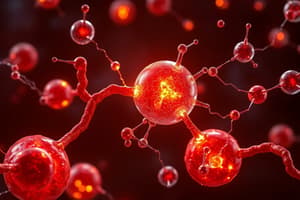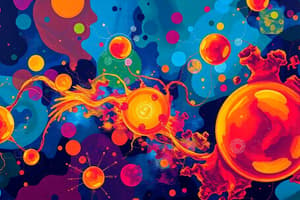Podcast
Questions and Answers
What is the primary function of catabolic pathways in metabolism?
What is the primary function of catabolic pathways in metabolism?
- To release energy by breaking down complex molecules. (correct)
- To synthesize complex molecules from simple ones.
- To store energy for later use.
- To maintain cellular structure and function.
What initiates a metabolic pathway?
What initiates a metabolic pathway?
- Environmental changes that affect cell processes.
- A specific enzyme that catalyzes the final step.
- A specific molecule that begins the reaction sequence. (correct)
- A feedback mechanism from the end product.
Which of the following statements about cellular respiration is true?
Which of the following statements about cellular respiration is true?
- It transforms matter without releasing energy.
- It extracts energy from sugars and other fuels in the presence of oxygen. (correct)
- It only occurs in the absence of oxygen.
- It breaks down carbon dioxide to produce energy.
What does the term 'metabolism' refer to?
What does the term 'metabolism' refer to?
What role do enzymes play in metabolic pathways?
What role do enzymes play in metabolic pathways?
Which statement describes the relationship between cellular metabolism and thermodynamics?
Which statement describes the relationship between cellular metabolism and thermodynamics?
What is primarily released as a byproduct during the process of cellular respiration?
What is primarily released as a byproduct during the process of cellular respiration?
In a multicellular organism, what is a primary advantage of metabolic pathways being responsive to changes?
In a multicellular organism, what is a primary advantage of metabolic pathways being responsive to changes?
Flashcards are hidden until you start studying
Study Notes
Overview: The Energy of Life
- Thousands of chemical reactions occur within living cells.
- These reactions assemble small molecules into polymers, break down polymers into monomers, and transform energy.
- Cells export chemical products and import raw materials.
- Cellular respiration uses oxygen to break down fuels, such as sugar, releasing energy that powers cellular work.
- Metabolism is a complex set of coupled chemical reactions that are highly organized, efficient, and responsive to changes.
Concept 8.1: An organism's metabolism transforms matter and energy, subject to the laws of thermodynamics.
- The sum total of an organism's chemical reactions is called metabolism.
- Metabolism is an emergent property of life that arises from interactions between molecules within the organized environment of a cell.
- Metabolism is organized into metabolic pathways.
- Each metabolic pathway begins with a specific molecule and proceeds through a series of steps, each catalyzed by a specific enzyme, to form a specific product.
- Catabolic pathways release energy by breaking down complex molecules into simpler molecules.
- Cellular respiration is a major pathway of catabolism in which sugars are fully broken down in the presence of oxygen to carbon dioxide and water, releasing energy.
- The energy released by catabolic pathways becomes available to do work, such as biosynthesis and movement.
Studying That Suits You
Use AI to generate personalized quizzes and flashcards to suit your learning preferences.




